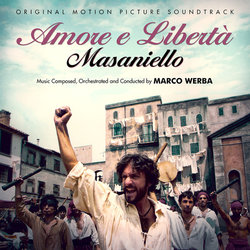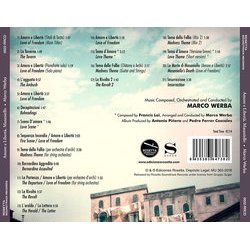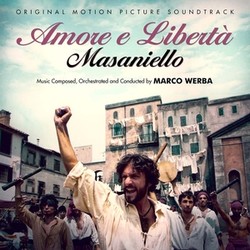Amore e libertį Masaniello
Stay better informed and get access to collectors info!
| # | Track | Artist/Composer | Duration |
|---|---|---|---|
| 1. | Amore e Libertą (Titoli di testa) | 1:07 | |
| 2. | La Taverna | 1:49 | |
| 3. | Amore e Libertą (Pianoforte solo) | 1:19 | |
| 4. | L'agguato | 0:58 | |
| 5. | Amore e Libertą | 3:57 | |
| 6. | Decapitazioni | 1:48 | |
| 7. | Scena D'amore * | *Music composed by Francis Lai | 1:47 |
| 8. | Sequenza incendio / Amore e Libertą | 2:04 | |
| 9. | Tema della Follia (per orchestra darchi) | 2:20 | |
| 10. | Bernardina aggredita | 0:49 | |
| 11. | La Partenza / Amore e Libertą (per orchestra darchi) | 1:53 | |
| 12. | La Rivolta | 3:38 | |
| 13. | L'araldo / La Lettera | 0:58 | |
| 14. | Amore e Libertą | 1:19 | |
| 15. | Tema d'Amore * | *Music composed by Francis Lai | 3:12 |
| 16. | Tema della Follia (Chitarra e archi) | 2:17 | |
| 17. | La Rivolta 2 | 1:44 | |
| 18. | Tema della follia (Mix 2) | 1:39 | |
| 19. | Tema d'Amore * (Versione breve) | *Music composed by Francis Lai | 1:10 |
| 20. | La morte di Masaniello (Amore e libertą) | 2:58 | |
| 21. | Insurrezione | 3:38 | |
| 42:24 |
Amore E Liberta Masaniello
Added on Saturday, May 12, 2018
Werbas music quality, alongside Lais theme, creates a very fortunate, world class duo. In fact, the score is constructed around several main themes, among which stands out the one dedicated to Masaniello, the protagonist, for whom Werba creates a moving, epic theme that can be heard in the Titoli di Testa, the main credits.
In 2006, film director Angelo Antonucci managed to get off the ground the project of adapting to the big screen his take on the life of the revolutionary Masaniello, who revolted against the Spanish viceroyalty in Napoli at the end of the XVII century, and who got the Neapolitan Republics declaration five months after his death.
Werbas music quality, alongside Lais theme, creates a very fortunate, world class duo. In fact, the score is constructed around several main themes, among which stands out the one dedicated to Masaniello, the protagonist, for whom Werba creates a moving, epic theme that can be heard in the Titoli di Testa, the main credits. The main instruments are the horns, alongside guitars and flutes, besides the Orchestras Choir. The theme can be heard as well in a great piano solo, performed by the composer himself in the track Amore e Libertį (Masaniello). Following in importance is Lais theme, which first appears in the Scena dAmore (Love scene), with flutes and guitars as the main instruments. Its a beautiful, lyrical theme, which the Italian composer uplifts masterfully. Finally, its worth to mention the theme around the protagonists madness (Tema de la Follia), of great dramatic intensity, not without some melancholic chromatics very noticeable in its guitar and orchestra version. We can mention as well Werbas variations conducting the orchestra in the sequences regarding the revolution, represented by La Rivolta, La Rivolta 2 and by the orchestral and coral tutti closing down the recording, and also by the epic climax titled Insurrezione, originally supported by a synthesizer to establish a rhythmic pattern that transforms the piece in a victorious march. Without a doubt, the score is amongst Marco Werbas finest and most elaborate works, a composer with a long, extremely varied professional career, whom the music fan can also enjoy in another of the works recently published by Rosetta, Made in China, Napoletano. A comedy now joined by this emblematic historical soundtrack, one of his highest and most celebrated creative summits, where Werba proves a mastery over melody and lyricism belonging to a real author, undeniably from the Italian School, running along the epic and dramatic atmosphere required, and whose listening will leave and unforgettable taste in the music fans palate.





